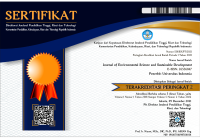Aims and Scope
Journal of Environmental Science and Sustainable Development (JESSD) is a peer review and open-access journal that provide to be a platform for academics, practitioners, and community representatives to explore and exchange ideas on environmental science and sustainable development issues in developing countries in the Asia-Pacific region. The journal primarily focuses on environmental science, with an emphasis on environmental pollution and greener production, as well as sustainable development, particularly addressing points 6, 7, 11, and 14. However, the Editors welcome contributions from research that address both environmental science and sustainable development. JESSD aims to advance scientific knowledge and understanding of the theoretical, methodological approaches, and practical aspects of environmental science and sustainable development issues. It is published by the School of Environmental Science at Universitas Indonesia as a freely accessible journal, contributing to the current body of research in this field. JESSD scope encompasses one primary field and three main field.
Primary Field of JESSD
| Field Name | AJCS Code | Sub-fields |
|---|---|---|
| Environmental Science | 2301 | Environmental Science (miscellaneous) |
| 2308 | Management, Monitoring, Policy and Law | |
| 2311 | Waste Management and Disposal |
Main Fields of JESSD
| Field Name | AJCS Code | Sub-fields |
|---|---|---|
| Earth and Planetary Science | 1901 | Earth and Planetary Sciences (miscellaneous) |
| Social Sciences | 3316 | Cultural Studies |
| 3305 | Geography, Planning and Development | |
| 3308 | Law | |
| Arts and Humanities | 1212 | Religious Studies |
These primary and main field are interconnected with two pillars Environmental Science and Sustainable Development including:
Environmental Science
- Environmental Science (miscellaneous): cover air quality monitoring and management, water pollution assessment and treatment, soil contamination and remediation, noise and vibration control, ecological resilience studies, biodiversity hotspot protection, and clean technology innovations for environmental improvement.
- Management, Monitoring, Policy and Law: involve the development of environmental governance frameworks, the formulation and assessment of environmental policies, the application of monitoring systems for resource sustainability, environmental impact assessment, and transboundary governance for shared natural resources.
- Waste Management and Disposal: address sustainable solid waste practices, circular economy approaches, hazardous waste minimization, recycling innovations, and environmentally sound waste-to-energy systems.
- Earth and Planetary Sciences (miscellaneous): covers interdisciplinary studies on earth system processes, geophysical dynamics, climate-land interactions, and planetary change that inform environmental sustainability and natural resource management.
- Advanced ecological systems analysis and biodiversity conservation: involve integrated studies of ecological resilience, species interactions, ecosystem dynamics, and conservation strategies for threatened habitats.
- Environmental toxicology and risk assessments: include the analysis of pollutant exposure, ecological and human health risks, biomonitoring, and predictive modeling of contaminant effects in environmental systems.
- Green chemistry and sustainable manufacturing processes: focus on the design of chemical products and processes that reduce or eliminate hazardous substances, lifecycle-based material innovation, and clean process integration.
- Climate change adaptation and resilience building: explore nature-based solutions, vulnerability assessments, adaptive land and water governance, and resilience strategies for urban and rural communities.
- Cultural studies: investigates how cultural values, local wisdom, and heritage practices influence environmental awareness and community resilience, fostering inclusive and sustainable societies in line with the SDGs on sustainable communities, responsible consumption, and climate action.
- Geography, planning and development: examines spatial dynamics, land-use planning, and sustainable settlement strategies that integrate environmental, social, and economic resilience, contributing to the SDG goals of sustainable cities, climate action, and life on land.
- Law: examines environmental and natural resource laws, governance mechanisms, and judicial systems to promote equitable access, biodiversity protection, and sustainable resource management, supporting the SDG targets of strong institutions, peace, and environmental protection.
- Religious Studies: renalyzes how religious values, ethical teachings, and spiritual leadership inspire pro-environmental behavior, community participation, and social responsibility, aligning with the SDG goals of peace, justice, strong institutions, and sustainable communities.
- Evidence-based conservation and resource management strategies: rely on empirical ecological data, socio-environmental assessments, and adaptive co-management frameworks to safeguard natural resources.
- Community-driven environmental initiatives and social innovation: examine grassroots environmental actions, local knowledge integration, participatory governance, and community-based adaptation practices.
- Environmental governance and policy frameworks: encompass institutional arrangements, regulatory instruments, environmental impact assessments, and transboundary governance for sustainable resource use.
- Ecosystem services and natural capital assessment: involve the valuation of ecological functions, biodiversity benefits, and ecosystem-based approaches in decision-making and policy planning.
- SDGs 6 (Clean Water and Sanitation): advancing innovative solutions for water resource management and sanitation technologies including water quality management and monitoring systems, innovative wastewater treatment technologies, water resource conservation and management, sanitation infrastructure development, community-based water management solutions, and water policy and governance frameworks
- SDGs 7 (Affordable and Clean Energy): pioneering research in renewable energy systems and energy efficiency including renewable energy implementation strategies, energy efficiency in society, clean energy technology adaptation, energy access and equity studies, smart grid development and integration, and energy policy and sustainable transitions
- SDGs 11 (Sustainable Cities and Communities): developing frameworks for urban sustainability and resilient community development including urban environmental management, sustainable infrastructure development, climate-resilient urban planning, green building initiatives, waste management systems, urban mobility solutions, community resilience strategies, and developing a cultural and religious community
- SDGs 14 (Life Below Water): protecting and preserving marine ecosystems through cutting-edge research including marine ecosystem conservation, coastal zone management, marine pollution prevention and control, sustainable fisheries practices, ocean acidification studies, marine biodiversity protection, and coastal community development
Sustainable Development






